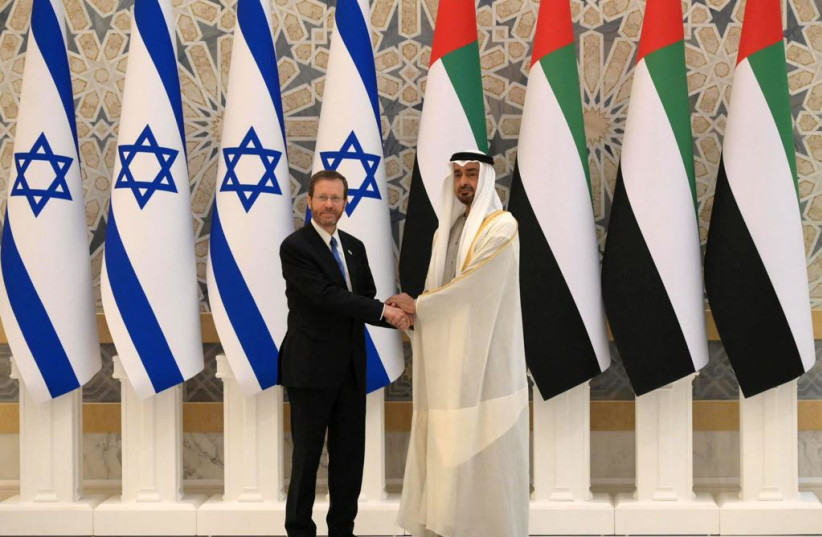Israeli President Isaac Herzog and first lady Michal Herzog arrived in Abu Dhabi Sunday for a historic two-day visit at the invitation of UAE Crown Prince Mohamed bin Zayed Al Nahyan.
For more stories from The Media Line go to themedialine.org
Herzog was greeted upon arrival by United Arab Emirates Foreign Minister Abdullah bin Zayed bin Sultan Al Nahyan.
The Herzogs’ route also marked an important first. It was the first time that an Israeli presidential airplane had flown over Saudi Arabia, a nation does that does not have formal relations with the Jewish state. The pilot took a moment to make the remarkable announcement, saying, “We are now right over Saudi Arabia. We are making history! We shall soon fly over the capital city [Riyadh].”
Prof. Joshua Teitelbaum, from Bar-Ilan University’s Department of Middle Eastern Studies, pointed out to The Media Line that Israeli Prime Minister Naftali Bennett already visited the United Arab Emirates last month to deal with concrete policy issues.
Still, Herzog’s visit is highly symbolic.

Teitelbaum explained that the Israeli presidency is a ceremonial post, and this particular president comes from a long line of important people. “They are an important family in Israel: His father [Chaim Herzog] was president and head of Israeli [Military] Intelligence, and he represents a very important family.”
And Chaim Herzog’s brother, Yaakov Herzog, was ambassador to Canada and later director-general of the Prime Minister’s Office. Their father and Isaac’s grandfather, Yitzhak Halevi Herzog, was Ashkenazi chief rabbi of the British Mandate of Palestine and later of Israel.
This is relevant, Teitelbaum said, because in the Gulf countries familial connections are especially prized.
Teitelbaum said the full diplomatic ties agreed upon in August 2020 need to be constantly reinforced.
“The relations are freshly established and need a kind of maintenance to keep things going,” he continued. “Since this is Israel’s ceremonial head of state, this is an important gesture.”
However, there may be more behind this week’s visit.
The situation in the region is rapidly changing and every country, including Israel, is trying to adapt, the professor noted.
“The US is trying to withdraw from the region, Iran is playing a lot of diplomacy in the area, and Israel wants to make its positions known,” Teitelbaum said. “It [the UAE hosting Herzog’s visit] certainly sends a message to Iran.”
Prof. Steven Wright from the Middle Eastern Studies Department at Hamad Bin Khalifa University in Doha, Qatar, said the visit underlines that both states view the other as a strategic partner. Additionally, he said, “It shows that there is political will on both sides to see the relationship expand in all areas.”
Wright added, “Herzog’s visit will be viewed as a clear statement of support for the UAE’s security against both the Houthis and Iran.”
Over the past few weeks, the UAE has been subject to missile and drone attacks from the Houthis, an Iran-backed rebel group in Yemen.
During his visit, Herzog will also visit Dubai, where he will open Israel Day at Expo 2020. This after the Houthi military spokesperson, Brig. Gen. Yahiya Saree, threatened that the rebels might target the World Expo.
Teitelbaum said, “President Herzog’s presence at Expo 2020 is certainly a statement of support and a suggestion that he feels safe enough being there despite the Houthi’s threats.”
Wright suggested that the president’s visit, so closely following the recent missile attack on Abu Dhabi, likely has concrete implications. “There is every reason to think the UAE will look at Israel’s Iron Dome defense system and consider how its own defense sector can collaborate with Israel to achieve a similar level of protection from Iran and the Houthis,” he said.
But Sawsan Hasson, director of the Middle East Economic Relations Department in Israel’s Foreign Ministry, told the Media Line, “The mere fact of the visit by Israel’s ‘first citizen,’ the president, is a tangible outcome. There are no agreements to be signed.”
When asked about the possibility of Israel supplying the UAE with an anti-missile defense system, she declined to comment.
After the Houthi attacks, Bennett was quick to telephone the UAE crown prince to demonstrate solidarity and offer Israel’s support to the Emirates.
All this could signify that ties between the countries are shifting from a diplomatic to a strategic relationship. During his visit, Herzog told Prince Mohamed, “We completely support your security requirements.”
As the official Emirates News Agency (WAM) stated, “The visit of the Israeli president to the UAE confirms that the relationship is moving forward.”
